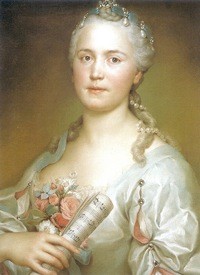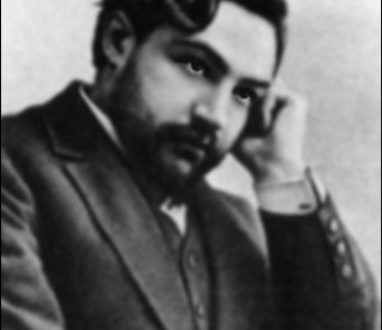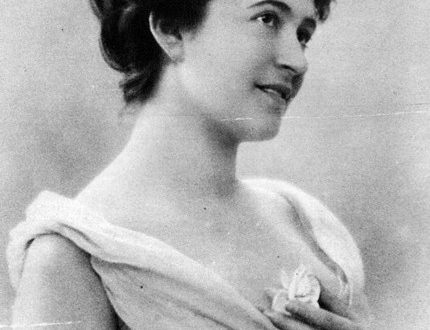
Regina Mingotti (Regina Mingotti) |
Queen Mingotti

Regina (Regina) Mingotti was born in 1722. Her parents were Germans. My father served as an officer in the Austrian army. When he went to Naples on business, his pregnant wife went with him. During the journey, she safely resolved to be a daughter. After the birth, Regina was taken to the city of Graz, in Silesia. The girl was only a year old when her father died. Her uncle placed Regina in the Ursulines, where she was brought up and where she received her first music lessons.
Already in early childhood, the girl admired the music performed in the chapel of the monastery. After a litany sung at one feast, she went, with tears in her eyes, to the abbess. Trembling with fear of possible anger and rejection, she began to beg to teach her to sing like the one that sang in the chapel. The Mother Superior sent her away, saying that she was very busy today, but she would think about it.
The next day, the abbess sent one of the senior nuns to find out from little Regina (that was her name then) who ordered her to make a request. The abbess did not, of course, think that the girl was guided only by her love of music; after all, she did send for her; said that she could give her only half an hour a day and would watch her abilities and diligence. Based on this, he will decide whether to continue classes.
Regina was delighted; the abbess the very next day began to teach her to sing – without any accompaniment. A few years later, the girl learned to play the harpsichord and from then on she accompanied herself very well. Then, learning to sing without the help of an instrument, she acquired the clarity of performance, which always distinguished her. In the monastery, Regina studied both the basics of music and solfeggio with the principles of harmony.
The girl stayed here until the age of fourteen, and after the death of her uncle, she went home to her mother. During her uncle’s lifetime, she was being prepared for tonsure, so when she arrived home, she seemed to her mother and sisters a useless and helpless creature. They saw in her a secular lady, brought up in a boarding school, without any idea about household chores. The mother of the mind could not help what to do with her and with her beautiful voice. Like her daughters, she could not foresee that this marvelous voice would in due time bring so much honor and benefit to its owner.
A few years later, Regina was offered to marry Signor Mingotti, an old Venetian and impresario of the Dresden Opera. She hated him, but agreed, hoping in this way to gain freedom.
People around talked a lot about her beautiful voice and manner of singing. At that time, the famous composer Nikola Porpora was in the service of the King of Poland in Dresden. Hearing her sing, he spoke of her at court as a promising young lady. As a result, it was suggested to her husband that Regina enter the Elector’s service.
Before the wedding, her husband threatened that he would never allow her to sing on stage. But one day, having come home, he himself asked his wife if she wanted to enter the court service. At first Regina thought he was laughing at her. But after her husband insistently repeated the question several times, she was convinced that he was serious. She immediately liked the idea. Mingotti gladly signed a contract for a small salary of three hundred or four hundred crowns a year.
C. Burney writes in his book:
“When Regina’s voice was heard at court, it was suggested that he would arouse the envy of Faustina, who was then still in the local service, but was already about to leave, and, consequently, Gasse, her husband, who also found out that Porpora, his old and a constant rival, they assigned one hundred crowns a month for Regina’s training. He said it was Porpora’s last stake, the only twig to grab onto, “un clou pour saccrocher.” Nevertheless, her talent made so much noise in Dresden that the rumor about him reached Naples, where she was invited to sing at the Bolshoi Theater. At that time she knew very little Italian, but immediately began to study it seriously.
The first role in which she appeared was Aristeia in the opera Olympias, set to music by Galuppi. Monticelli sang the role of Megacle. This time her acting talent was as much applauded as her singing; she was bold and enterprising, and, seeing her role in a different light than was customary, she, contrary to the advice of old actors who did not dare to deviate from custom, played completely differently than all her predecessors. It was done in that unexpected and daring manner in which Mr. Garrick first struck and charmed English spectators, and, disregarding the limited rules set by ignorance, prejudice, and mediocrity, created a style of speech and game that has since been unfailingly met with stormy approval by the whole nation, not just applause.
After this success in Naples, Mingotti began to receive letters from all European countries with offers of contracts in various theaters. But, alas, she could not accept any of them, bound by obligations with the Dresden court, because she was still in the service here. True, her salary was significantly increased. On this increase, she often expresses her gratitude to the court and says that she owes him all her fame and fortune.
With the greatest triumph, she again sings in the “Olympiad”. The listeners unanimously recognized that her possibilities in terms of voice, performance and acting were very great, but many considered her completely incapable of anything pathetic or tender.
“Gasse was then busy composing the music for Demofont, and she believed that he had kindly let her sing the Adagio with pizzicato violin accompaniment, solely in order to reveal and show her shortcomings,” Burney writes. “However, suspecting a trap, she worked hard to avoid it; and in the aria “Se tutti i mail miei,” which she subsequently performed to loud applause in England, her success was so great that even Faustina herself was silenced. Sir C.G. was the English ambassador here at the time. Williams and, being in close proximity with Gasse and his wife, he joined their party, publicly declaring that Mingotti was completely incapable of singing a slow and pathetic aria, but when he heard it, he publicly retracted his words, asked her for forgiveness for having doubted her talent, and subsequently was always her faithful friend and supporter.
From here she went to Spain, where she sang with Giziello, in an opera directed by Signor Farinelli. The famous “Muziko” was so strict about discipline that he did not allow her to sing anywhere except the court opera, and even to practice in the room overlooking the street. In support of this, we can cite an incident related by Mingotti herself. Many nobles and grandees of Spain asked her to sing in home concerts, but she could not get permission from the director. He extended his prohibition so far as to deprive a pregnant high-ranking lady of the pleasure of hearing it, since she was unable to go to the theatre, but declared that she longed for an aria from Mingotti. The Spaniards had a religious reverence for these involuntary and violent passions of women in a similar position, however dubious they may be considered in other countries. Therefore, the lady’s husband complained to the king about the cruelty of the opera director, who, he said, would kill his wife and child if his majesty did not intervene. The king graciously heeded the complaint and ordered Mingotti to receive the lady at his home, the order of his majesty was implicitly carried out, the lady’s desire was satisfied.
Mingotti stayed in Spain for two years. From there she went to England. Her performances in “foggy Albion” were a great success, she aroused the enthusiasm of both the audience and the press.
Following this, Mingotti went to conquer the largest stages of Italian cities. Despite the more than benevolent reception in various European countries, while Elector Augustus, King of Poland, was alive, the singer always considered Dresden to be her hometown.
“Now she settled in Munich rather, one must think, because of cheapness than out of affection,” Bernie wrote in his diary in 1772. – She does not receive, according to my information, a pension from the local court, but thanks to her savings she has sufficient funds with savings. She seems to live quite comfortably, is well received at court, and is respected by all those who are capable of appreciating her intelligence and enjoying her conversation.
I took great pleasure in listening to her discourses on practical music, in which she showed no less knowledge than any Maestro di cappella with whom I have ever conversed. Her mastery of singing and the power of expressiveness in different styles is still amazing and should delight anyone who can enjoy a performance that is not associated with the charm of youth and beauty. She speaks three languages - German, French and Italian – so well that it’s hard to tell which one is her mother tongue. She also speaks English and enough Spanish to carry on a conversation with them, and understands Latin; but in the first three languages named it is truly eloquent.
… She tuned her harpsichord, and I convinced her to sing to this only accompaniment for almost four hours. Only now did I understand her high skill of singing. She does not perform at all, and says that she hates the local music, for it is seldom well accompanied and well listened to; her voice, however, has improved a lot since she was last in England.”
Mingotti lived a long life. She died at the age of 86, in 1808.





